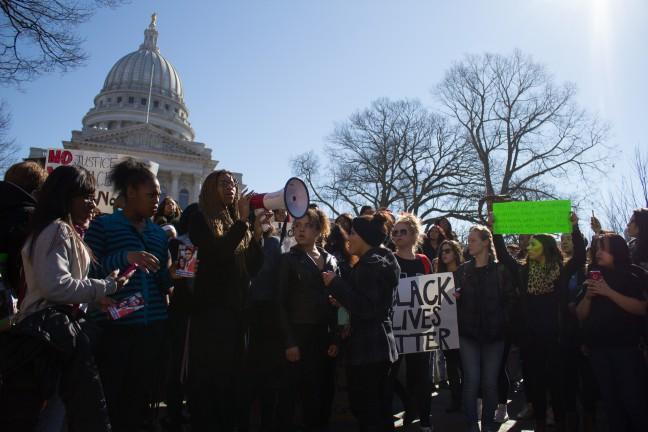Shouts of “all power to the people” and “no justice, no peace” could be heard echoing from Bascom Hill to Madison East High School to Williamson Street Monday afternoon as community members continued to take to the streets in protest of the death of 19-year-old Tony Robinson.
Protestors including high schoolers from East High, University of Wisconsin students and Young Gifted and Black organizers began marching from areas across the city before converging on the Capitol rotunda where their numbers reached around 2,000.
Three tiers of protest at #MadisonCapitol for #TonyRobinson pic.twitter.com/UcvvRFJfjX
— Alex Arriaga (@alexarriaga__) March 9, 2015
UW students assembled on Bascom Hill in the morning while across town Madison East High School students walked out of their classes at 10:00 a.m. Both groups began their treks to the Capitol, chanting “black lives matter” and “Tony Robinson.”
Two police cars escorted the group of about 200 middle and high school students toward the Capitol and diverted traffic along the way. As cars passed by, some would honk along with the crowd’s chants of “show me what democracy looks like” and other drivers stopped to capture pictures with their smart phones.
https://twitter.com/rlallensack/status/574966314411933696
Once they reached the Capitol, protest leaders encouraged adult attendees to form a human barrier around the steps to ensure the safety of the children protesting.
https://twitter.com/SarahZimmie/status/574977266821652480
UW students showed solidarity with the organized walk-out as freshmen Natasha Thimmesch and Teresa Baymon helped coordinate the campus effort that drew students, community members and UW administrators including Dean of Students Lori Berquam.

Berquam said Robinson’s death was a tragedy for many. She voiced appreciation for Thimmesch and Baymon for starting conversations on campus.
“I appreciated the student leaders in this effort saying right up front that this is a peaceful, powerful way to come together with others across the city and our community to talk about how this impacts us,” Berquam said. “I think that’s the important part, engaging in conversations with each other.”
Madison community members peacefully protest officer involved shooting of 19-year-old male
Later in the afternoon, Turin Carter, Robinson’s uncle, spoke at a press conference on behalf of the family and expressed gratitude for the community’s support.
With the city now stained with the blood of his nephew, Carter said everyone must deal with the aftermath of the tragedy.
He emphasized that Robinson shouldn’t be judged on past mistakes, saying Friday night’s events were irrelevant to his nephew’s character or history.
“He was a good, kindhearted kid that was very happy and just wanted to be accepted and wanted to be loved and that desire for love led him to bad places,” he said. “But he was somebody that paid his debt to society according to society and was actively trying to better himself.”
Carter encouraged everybody to show support regardless of race, because race is a universal issue that everyone can relate to. He said the issue goes beyond the idea of black lives matter because all lives matter.
He highlighted Robinson’s racial ambiguity and said it reinforces that America’s racial lines are “100 percent blurred.”
“[Tony was] black, white, he’s a mixture of everything because we all have our own complex heritages,” Carter said. “Which is the problem with the way that police policies are being carried out, specifically as it pertains to young black men because the numbers don’t lie.”
Carter emphasized that while police are a necessary entity in society, the officer’s use of excessive force Friday was inexcusable, adding he absolutely believed his nephew should still be alive. He said the mindset around police needs to change and this would begin with procedural action.
“I want to make this clear, law enforcement is necessary,” he said. “We are not proponents of anti-police. In terms of the chants that I hear going on, in regards to not trusting police we don’t condone that…[it was] an individual act that the entire police department has to take the responsibility for.”
Carter said he was upset with the way his family had been treated, especially since Robinson’s mother had not yet been able to see her son’s body. He said he felt it could have been handled better, with “a lot more respect afforded to us.”
“This is a bigger issue than Tony,” he said. “This highlights a universal problem with law enforcement and how its procedures have been carried out…And specifically, as it pertains to the systematic targeting of young black males.”
Tony Robinson’s death: a portrait of a life ended, a life halted, a community united
At a press conference earlier in the afternoon, Madison Mayor Paul Soglin invited the crowd of protestors to join in a deeper discussion of racism. He praised the response of the community after Robinson’s death and said he was supportive of protesters as they grieve.
“We’re in the midst of one of the most tragic episodes for this city and community,” Soglin said.
https://twitter.com/SarahZimmie/status/574969124209688576
Community members also gathered at the Madison Police and Fire Commission to express their concerns surrounding police action. The audience flowed out into the hallway of the building.
Many mothers and grandmothers expressed hurt for losing one of their own and fear for their children and the future of the black community.
In the evening, UW’s Residence Life held a forum in Witte for students to cope with the tragedy, but faced a low turn-out.
The way this tragedy is being handled by UW administration contradicts diversity framework, Sanera Jome, senior and international student diversity coordinator, said.
“I would like, for once, the university itself to back the students and talk directly in the face of diversity and inclusion issues on campus,” Jome said.
Rachael Lallensack, Alex Arriaga, Sarah Zimmermann, Hayley Sperling and Emily Neinfeldt contributed reporting to this article.







